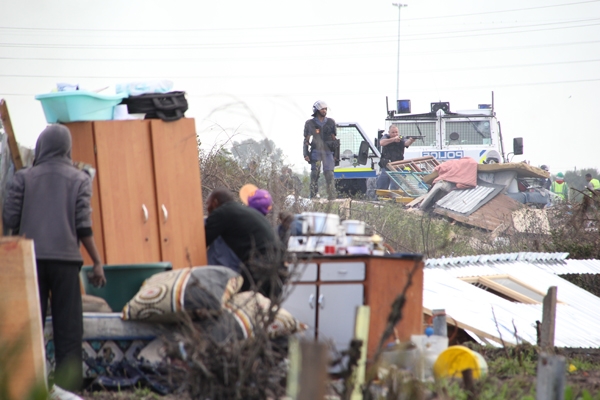What the law says about police using violence

Police are only allowed to use force as an absolute last resort when managing protests. But recent violence around several evictions of shackdwellers in Cape Town, prompted GroundUp to establish what the law says.
In August, at the Lwandle Commission of Inquiry, the South African Police Service (SAPS) were hammered for apparently waiving key requirements of the National Instruction for Public Order Policing while enforcing Sanral’s controversial eviction of shack dwellers in June.
Few Public Order Policing (POP) operations are as independently and as publicly scrutinised as happened at the commission. The aggressive cross-examination by the commissioners of POP commanders should serve as a reminder that the police are legally obliged to avoid the use of force “at all cost” when managing crowds and protests.
Fast forward from Lwandle to the sight of another eviction, violently enforced by POP, on 22 August at Philippi East’s Marikana informal settlement. Police officers fired rounds of rubber bullets and tear gas cannisters in running battles with residents who threw stones and resisted the demolition of their shacks. The fighting went on for hours. 17 people were arrested. During the course of the morning, POP officers also fired their service pistols at protesters; how many times and on how many occasions is not known. 30-year-old Patrick Sobutyu was shot in both legs.
The violence of this most recent round of Marikana evictions presents a failure – rather than a success – of public order policing. A successful operation, according to the National Instruction (NI), is one which minimises the use of force, injury and loss of life. NI prescribes a process of ongoing negotiation, building trust and conflict resolution with the group being “managed”. Force must be avoided “at all cost” and the police must display the “highest degree of tolerance”.
When force is unavoidable, it must be “minimal”, “reasonable in the circumstances”, geared towards “de-escalating” the conflict and applied only upon instruction from the commanding officer.
The apparent lack of negotiation preceding the barrage of rubber bullets in Lwandle in June and Philippi East in August was a concern raised by commissioners and community leaders respectively.
Regardless, the use of live ammunition is prohibited in crowd management operations. Yet, in the face of mounting evidence and a number of queries from GroundUp, the police are yet to answer about whether live rounds were used while enforcing the Philippi East evictions.
Initially, the police “adamantly” denied that live rounds were fired. This position was later changed to an “investigation” of the allegations only after video footage emerged of POP officers firing their side arms. A clip recorded on the day showing service pistols being discharged can be viewed here.
Allegations (and video footage) of police shooting live ammunition should not be difficult to confirm if protocol is followed. The NI requires that POP record “all actions and incidents” and that a “record is kept of each member’s equipment and ammunition”.
Moses Dlamini, spokesman for the Independent Police Investigative Directorate (IPID), has confirmed that the police reported the use of rubber bullets but made no reference to injuries or the discharge of service pistols by POP in Philippi East on the morning in question. Notifying the directorate when force is used by POP is legally required by the NI.
David Bruce, an independent researcher into policing and crime in South Africa says the police’s “inattentiveness” towards Sobutyu’s case is typical of an institutional culture geared towards protecting police officers from accountability rather than holding officers accountable.
“It’s a hangover from apartheid era policing, but one that is contradicted by legal mechanisms (like the NI) designed to check the use of force and hold officers accountable,” he says.
In a culture that closes ranks, investigations by the directorate can take months to complete; such as the lingering investigation into the murder of Letshekang Thokoane, a protester beaten by police and shot in the forehead with a rubber bullet at point blank range in January last year.
IPID learned of Sobutyu’s shooting through GroundUp’s reporting. On 28 August, Dlamini said the directorate would “investigate”.
Sobutyu, still unable to walk and recovering in a backyard shack in Delft, awaits them to make contact.
“It upsets me, because I know that the man who shot me will probably get away with it,” says Sobutyu.
“But, I did not get away. I cannot walk, I cannot work and this means I can no longer provide for my family.”
Support independent journalism
Donate using Payfast

Don't miss out on the latest news
We respect your privacy, and promise we won't spam you.

This article is licensed under a Creative Commons Attribution-NoDerivatives 4.0 International License.
